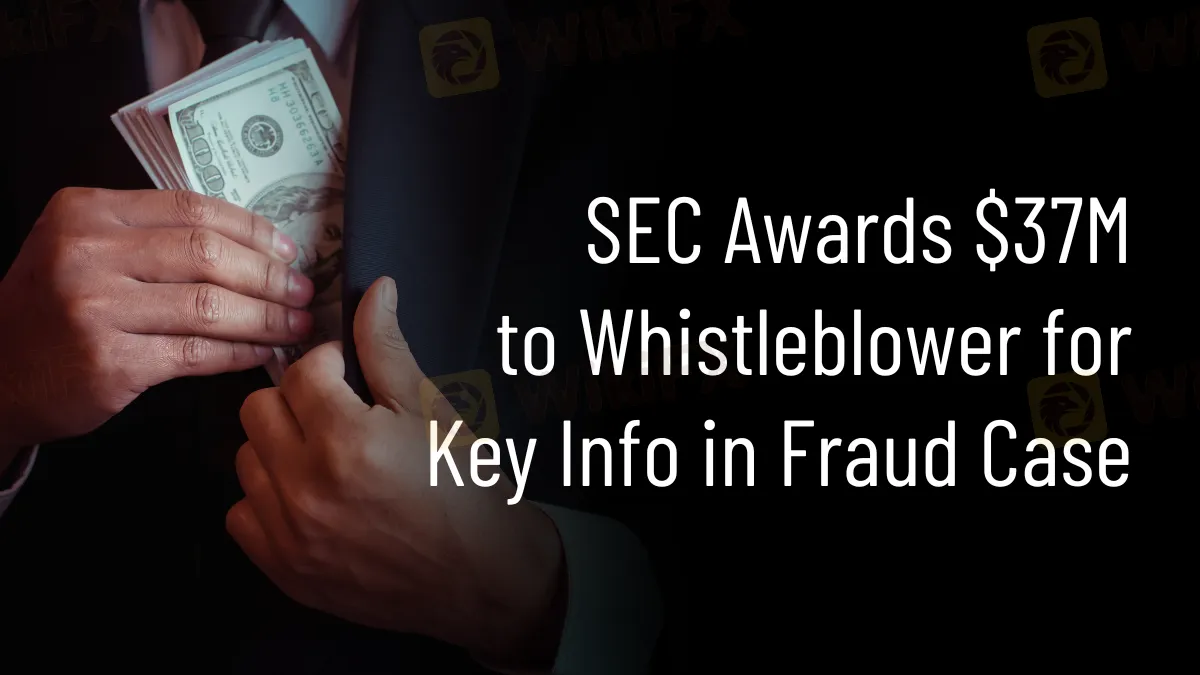简体中文
繁體中文
English
Pусский
日本語
ภาษาไทย
Tiếng Việt
Bahasa Indonesia
Español
हिन्दी
Filippiiniläinen
Français
Deutsch
Português
Türkçe
한국어
العربية
SEC Awards $37M to Whistleblower for Key Info in Fraud Case
Abstract:The SEC has awarded $37 million to a whistleblower for providing crucial information that led to a successful fraud investigation, highlighting the program's impact.

The Securities and Exchange Commission (SEC) has awarded a whistleblower $37 million for providing critical information that led to the successful completion of a large enforcement case. This significant prize emphasizes the critical role of whistleblowers in detecting and combating securities fraud.
According to the SEC's formal ruling, the whistleblower's tip was critical in starting an inquiry into complicated and difficult-to-detect offenses. This person was the first to notify the SEC of previously undiscovered misbehavior, providing critical information and assistance that moved the investigation ahead. Their early contributions and later supplemental information were critical in moving the case forward.
The SEC has not revealed the identity of the whistleblower or the company implicated in the alleged misbehavior in accordance with its commitment to maintaining informant confidentiality. Confidentiality is a key component of the whistleblower program, ensuring that people feel comfortable sharing critical information.
“Today's award highlights the significance of the SEC's whistleblower program, as the whistleblower's information assisted the agency in returning millions of dollars to harmed investors,” said Creola Kelly, Chief of the SEC's Office of the Whistleblower. This statement focuses on the program's overall effect on investor protection and market integrity.

Since its establishment, the SEC's whistleblower program has paid out about $2 billion to informants. These reimbursements have been critical in detecting and preventing a broad variety of securities crimes, such as insider trading, accounting fraud, and bribery. The program, created by the Dodd-Frank Wall Street Reform and Consumer Protection Act of 2010, incentivizes people to report possible securities law breaches by granting monetary prizes for information that leads to successful enforcement proceedings.
The SEC made news in May 2023 when it awarded a record $279 million to a whistleblower whose tip resulted in over $4 billion in recovery. This is still the largest payment in the history of the SEC's whistleblower program, highlighting the substantial financial incentives available to whistleblowers who contribute to big enforcement actions.
Whistleblowers may get 10% to 30% of the monetary penalty collected by the SEC if their information leads to successful enforcement proceedings. The SEC determines the actual compensation, taking into account criteria such as the relevance of the information submitted and the extent of help provided throughout the inquiry.
Some legislators and business organizations have criticized the SEC's whistleblower program, claiming that it encourages people to benefit by informing their employers or coworkers. Despite this criticism, advocates believe the program is a critical tool for addressing corporate fraud and wrongdoing, safeguarding investors, and increasing financial market openness.
Overall, the $37 million reward to this whistleblower not only celebrates their vital effort but also highlights the significance of the SEC's whistleblower program in preserving financial market integrity and protecting investor interests.

Disclaimer:
The views in this article only represent the author's personal views, and do not constitute investment advice on this platform. This platform does not guarantee the accuracy, completeness and timeliness of the information in the article, and will not be liable for any loss caused by the use of or reliance on the information in the article.
Read more

Malaysian Influencer Detained in Taiwan Over Alleged Role in Fraud Scheme
Malaysian influencer Hu Chang Mun, widely known as Ady Hu, has been detained in Taiwan for his alleged involvement in a fraudulent operation. The 31-year-old, who was reported missing earlier in December, was located by Taiwanese authorities after suspicions arose regarding his activities.

MultiBank Group Wins Big at Traders Fair Hong Kong 2024
Discover how MultiBank Group, a global leader in financial derivatives, secured three prestigious awards at Traders Fair Hong Kong 2024, highlighting its innovative trading solutions and industry excellence.

CySEC Settles Compliance Case with Fxview Operator Charlgate Ltd
Discover how CySEC resolved compliance issues with Charlgate Ltd, the operator of Fxview, through a €50,000 settlement. Explore the investigation, regulatory measures, and CySEC's new website designed for improved accessibility and transparency.

TradingView Launches Liquidity Analysis Tool DEX Screener
Discover TradingView's DEX Screener, a powerful tool for analyzing decentralized exchange trading pairs. Access metrics like liquidity, trading volume, and FDV to make smarter, data-driven trading decisions.
WikiFX Broker
Latest News
Volkswagen agrees deal to avoid Germany plant closures
Geopolitical Events: What They Are & Their Impact?
Top 10 Trading Indicators Every Forex Trader Should Know
TradingView Launches Liquidity Analysis Tool DEX Screener
MultiBank Group Wins Big at Traders Fair Hong Kong 2024
WikiEXPO Global Expert Interview: Simone Martin—— Exploring Financial Regulation Change
'Young investors make investment decisions impulsively to keep up with current trends' FCA Reveals
Why Do You Feel Scared During Trade Execution?
CySEC Settles Compliance Case with Fxview Operator Charlgate Ltd
Malaysian Influencer Detained in Taiwan Over Alleged Role in Fraud Scheme
Currency Calculator


